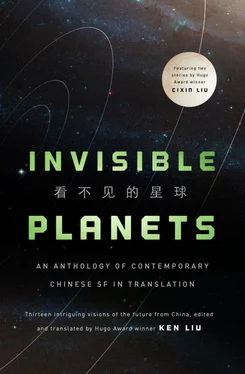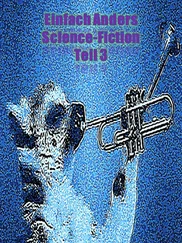Between the marching columns are two Cyclopes in white robes, each as tall as a three-story house. They carry a palanquin on their shoulders, and from within Xiao Qian’s song rolls out, each note as bright as a star in the sky, falling one by one onto my head.
Fireworks of all colors rise up: bright crimson, pale green, smoky purple, shimmering gold. I look up and feel as though I’m becoming lighter myself, floating into the sky.
As the parade passes from west to east, all the ghosts along the sides of the street join, singing and dancing. They’re heading for the old osmanthus tree at the eastern end of Ghost Street, whose trunk is so broad that three men stretching their arms out can barely surround it. A murder of crows lives there, each one capable of human speech. We call the tree Old Ghost Tree, and it is said to be in charge of all of Ghost Street. Whoever pleases it prospers; whoever goes against its wishes fails.
But I know that the parade will never get to the Old Ghost Tree.
When the parade is about halfway down the street, the earth begins to shake and the slate slabs crack open. From the yawning gaps, huge white bones crawl out, each as thick as the columns holding up Lanruo Temple. The bones slowly gather together and assemble into a giant skeleton, glinting like white porcelain in the moonlight. Now black mud springs forth from its feet and crawls up the skeleton, turning into flesh. Finally, a colossal Dark Yaksha stands before us, its single horn so large that it seems to pierce the night sky.
The two Cyclopes don’t even reach its calves.
The Dark Yaksha turns its huge head from side to side. This is a standard part of every Carnival. It is supposed to abduct a tourist. On nights when there are no tourists, it must go back under the earth, disappointed, to wait for the next opportunity.
Slowly it turns its gaze on me, focusing on my presence. I pull off my mask and stare back. Its gaze feels hot, the eyes as red as burning coal.
Xiao Qian leans out from the palanquin, and her cry pierces the suddenly quiet night air: “Ning, run! Run!”
The wind lifts the corner of her dress, like a dark purple petal unfolding. Her face is like jade, with orange lights flowing underneath.
I turn and run as fast as I can. Behind me, I hear the heavy footsteps of the Dark Yaksha. With every quaking, pounding step, shingles fall from houses on both sides like overripe fruits. I am now running like the wind, my bare feet striking the slate slabs lightly: pat, pat, pat. My heart pounds against my chest: thump, thump, thump. Along the entire frenzied Ghost Street, mine is the only living heart.
But both the ghosts and I know that I’m not in any real danger. A ghost can never hurt a real person. That’s one of the rules of the game.
I run toward the west, toward Lanruo Temple. If I can get to Yan Chixia before the Yaksha catches me, I’ll be safe. This is also part of the performance. Every Carnival, Yan puts on his battle gear and waits on the steps of the main hall.
As I approach, I cry out, “Help! Save me! Oh, Hero Yan, save me!”
In the distance, I hear his long ululating cry and see his figure leaping over the wall of the temple to land in the middle of the street. He holds in his left hand a Daoist charm: a red character written against a yellow background. He reaches behind his back with his right hand and pulls out his sword, the Demon Slayer.
He stands tall and shouts into the night sky, “Brazen Demon! How dare you harm innocent people? I, Yan Chixia, will carry out justice today!”
But tonight, he forgot to wear his sedge hat. His egg-shaped face is exposed to the thousands of lanterns along Ghost Street, with just a few wisps of hair curled like question marks on a blank page. The silly sight is such a contrast against his serious mien that I start to laugh even as I’m running. And that makes me choke, and I can’t catch my breath, so I fall against the cold slate surface of the street.
This moment is my best memory of the summer.
COLD DEW, THE SEVENTEENTH SOLAR TERM:
A thin layer of clouds hides the moon. I’m crouching by the side of the lotus pond in Lanruo Temple. All I can see are the shadows cast by the lotus leaves, rising and falling slowly with the wind.
The night is as cold as the water. Insects hidden in the grass won’t stop singing.
The eggplants and string beans in the garden are ripe. They smell so good that I have a hard time resisting temptation. All I can think about is stealing some under the cover of night. Maybe Yan Chixia was right: in a previous life, I must have died of hunger.
So I wait and wait. But I don’t hear Yan Chixia’s snores. Instead, I hear light footsteps cross the grassy path to stop in front of Yan Chixia’s cabin. The door opens, the steps go in. A moment later, the voices of a man and a woman drift out of the dark room: Yan Chixia and Xiao Qian.
Qian: “Why did you ask me to come?”
Yan: “You know what it’s about.”
Qian: “I can’t leave with you.”
Yan: “Why not?”
Qian: “A few more years. Ning is still so young.”
“Ning, Ning!” Yan’s voice grows louder. “I think you’ve been a ghost for too long.”
Qian sounds pitiful. “I raised Ning for so many years. How can I just get up and leave him?”
“You’re always telling me that Ning is still too young, always telling me to wait. Do you remember how many years it has been?”
“I can’t.”
“You sew a new set of clothes for him every year. How can you forget?” Yan chuckles, a cold sound. “I remember very clearly. The fruits and vegetables in this garden ripen like clockwork, once a year. I’ve seen them do it fifteen times. Fifteen! But has Ning’s appearance changed any since the year he turned seven? You still think he’s alive, he’s real?”
Xiao Qian remains silent for a moment. Then I hear her crying.
Yan sighs. “Don’t lie to yourself anymore. He’s just like us, nothing more than a toy. Why are you so sad? He’s not worth it.”
Xiao Qian just keeps on crying.
Yan sighs again. “I should never have picked him up and brought him back.”
Xiao Qian whispers through the tears, “Where can we go if we leave Ghost Street?”
Yan has no answer.
The sound of Xiao Qian’s crying makes my heart feel constricted. Silently I sneak away and leave the old temple through a hole in the wall.
The thin layer of clouds chooses this moment to part. Icy moonlight scatters itself against the slate slabs of the street, congealing into drops of glittering dew. My bare feet against the ground feel so cold that my whole body shivers.
A few stores are still open along Ghost Street. The vendors greet me enthusiastically, asking me to sample their green bean biscuits and sweet osmanthus cake. But I don’t want to. What’s the point? I’m just like them, maybe even less than them.
Every ghost used to be alive. Their fake mechanical bodies host real souls. But I’m fake throughout, inside and outside. From the day I was born, made, I was fake. Every ghost has stories of when they were alive, but I don’t. Every ghost had a father, a mother, a family, memories of their love, but I don’t have any of that.
Xiao Qian once told me that Ghost Street’s decline came about because people, real people, found more exciting, newer toys. Maybe I am one of those toys—made with newer, better technology until I could pass for the real thing. I can cry, laugh, eat, piss and shit, fall, feel pain, ooze blood, hear my own heartbeat, grow up from a simulacrum of a baby—except that my growth stops when I’m seven. I’ll never be a grown-up.
Ghost Street was built to entertain the tourists, and all the ghosts were their toys. But I’m just a toy for Xiao Qian.
Читать дальше












